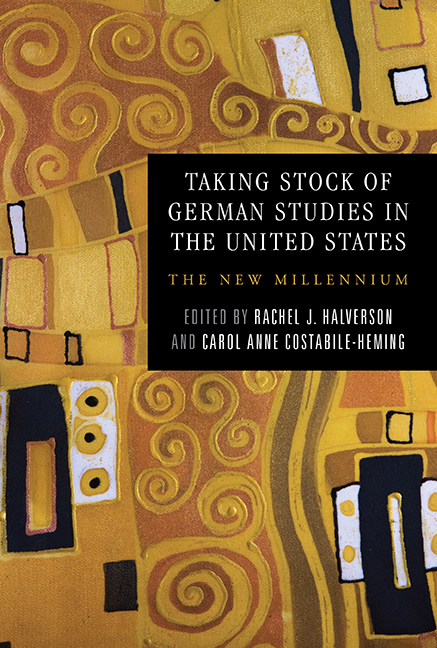5 - Responding to a Changing Profession: A Reflection on AATG Programs and Their Effects on German at a Liberal Arts Institution
Published online by Cambridge University Press: 10 June 2021
Summary
WHAT DOES IT MEAN TO BE a German professor in the second decade of the twenty-first century? What and how should we teach? How do we respond to the changing needs of students in an ever-transforming global society? In an attempt to provide some guidance to these overarching questions, the Modern Language Association's (MLA) Ad Hoc Committee on Foreign Languages published “Foreign Languages and Higher Education: New Structures for a Changed World” in May 2007 and recommended substantial changes for language departments, including the need to move beyond a national literary canon in favor of a broad interdisciplinary studies approach to teaching culture. Since the report was published, it has been the center of national debates within the German studies community due to its content, suggestions, and potential effects on German programs, curriculum, hiring practices, and even the teaching of language. Its publication initiated hefty discussions in many leading professional journals, including Academe, ADFL Bulletin, German Quarterly, Die Unterrichtspraxis/Teaching German (UP), Journal of Language and Literacy Review, Modern Language Journal, Neues Curriculum, and Profession. In this essay, I articulate what the suggestions of the MLA Ad Hoc Committee mean to my undergraduate program, while contextualizing teaching German language and culture in a small German program at a comprehensive liberal arts college located in the Midwest; review recent American Association of Teachers of German (AATG) programs and initiatives designed to foster leadership and enhance program development; discuss how these AATG programs have helped bolster my program, and then offer some suggestions on how we, as a profession, may be able to attract and retain more students and teach them the language and culture we hold so valuable.
Translingual and Transcultural Competency in the Language-Centered Classroom: The MLA Report
The overarching theme and arguably most important point of the MLA position paper is that translingual and transcultural competency should be the focus of foreign language education. These “lofty educational goals,” as Heidi Byrnes calls them, are noble, and few in our profession, if any, would argue against them. As Friederike Eigler and Gabi Kathofer have pointed out in their response to the recommendations, curricula must be reorganized around the constitutive notion of language; course material must be situated within a cultural, historical, and linguistic context instead of being taught instrumentally and divorced from context.
- Type
- Chapter
- Information
- Taking Stock of German Studies in the United StatesThe New Millennium, pp. 89 - 103Publisher: Boydell & BrewerPrint publication year: 2015



